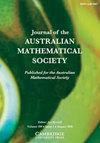关于某些谎言群的定性不确定性原理
IF 0.8
4区 数学
Q3 MATHEMATICS
引用次数: 0
摘要
在这篇文章中,我们研究了定性不确定性原理在某些李群上的最新发展。特别是,我们认为,如果某些阶二零potent Lie 群上的 Weyl 变换是有限秩的,那么只要函数的非消失集具有有限度量,函数几乎处处都必须为零。此外,我们还考虑到,如果海森堡运动群上合适函数的每个傅里叶-维格纳片的韦尔变换是有限秩的,那么只要每个傅里叶-维格纳片的非消失集具有有限度量,该函数几乎处处为零。本文章由计算机程序翻译,如有差异,请以英文原文为准。
QUALITATIVE UNCERTAINTY PRINCIPLE ON CERTAIN LIE GROUPS
In this article, we study the recent development of the qualitative uncertainty principle on certain Lie groups. In particular, we consider that if the Weyl transform on certain step-two nilpotent Lie groups is of finite rank, then the function has to be zero almost everywhere as long as the nonvanishing set for the function has finite measure. Further, we consider that if the Weyl transform of each Fourier–Wigner piece of a suitable function on the Heisenberg motion group is of finite rank, then the function has to be zero almost everywhere whenever the nonvanishing set for each Fourier–Wigner piece has finite measure.
求助全文
通过发布文献求助,成功后即可免费获取论文全文。
去求助
来源期刊
CiteScore
1.70
自引率
0.00%
发文量
36
审稿时长
6 months
期刊介绍:
The Journal of the Australian Mathematical Society is the oldest journal of the Society, and is well established in its coverage of all areas of pure mathematics and mathematical statistics. It seeks to publish original high-quality articles of moderate length that will attract wide interest. Papers are carefully reviewed, and those with good introductions explaining the meaning and value of the results are preferred.
Published Bi-monthly
Published for the Australian Mathematical Society

 求助内容:
求助内容: 应助结果提醒方式:
应助结果提醒方式:


